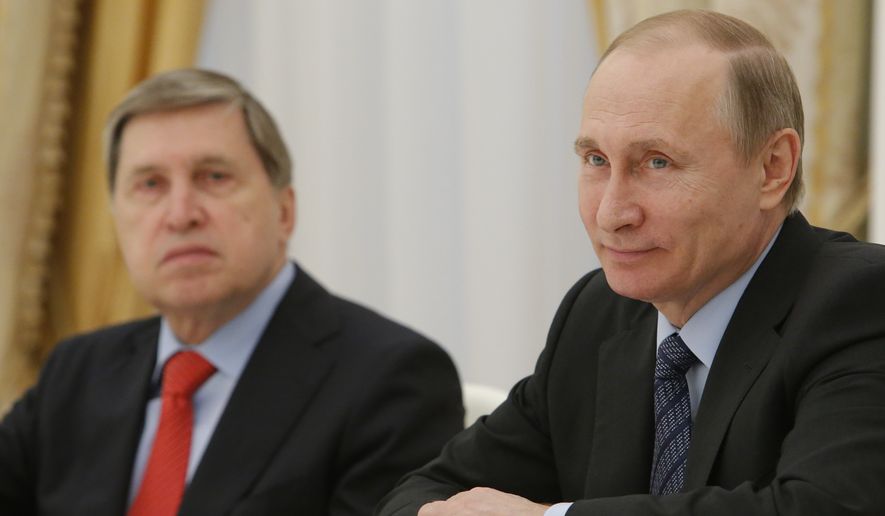ANALYSIS/OPINION:
The Obama administration pushed sanctions against Russia for its illegal annexation of the Crimean Peninsula in Ukraine in 2014 and for the Kremlin’s backing of separatists in eastern Ukraine that continues to this day. The goal was to punish Russia for its actions, and to paraphrase President Obama, “to run their economy into the ground.”
The sanctions, however, aren’t working as advertised.
A key part of the strategy was to starve Russia and Russian companies of badly needed capital by cutting off access to Western capital markets. But just this week, Russia offered the first tranche of a $3 billion, 10-year sovereign bond to the debt capital markets. Yes, Western companies and investors did not participate, afraid to run afoul of the sanctions. Yes, Moscow only raised $1.75 billion of the $3 billion needed to help close the federal budget gap. Yes, Russia most likely overstated the participation of “foreigners” in placing the bond. And, yes, international clearing agencies may not settle the bond.
Still, the sale was momentous milestone.
Bond investors want to make money. With the Federal Reserve keeping American interest rates basically at zero (so we can service our debt and not kill the Obama economy completely), there is no yield — and little profit — to be found in developed country capital markets. The Russian bonds were placed at 4.75 percent, which is not an unacceptable number for the Kremlin’s coffers.
SEE ALSO: Putin-Elton John summit on gay rights won’t come off after all
What does all this tell you? It tells you there is demand for Russian paper. Does anyone think that without the sanctions, Russia would have any problem placing a lousy $3 billion?
The Russian state-run bank VTB was the underwriter, as no Western banks would touch the offering. The prospectus promised the funds would only be used to shore up the Kremlin’s cash reserves and would not be siphoned off to fund cash-strapped Russian companies facing sanctions. The offering also warned that “no assurance can be given as to whether interests in the global bonds will be eligible to be held through any clearing system other than NSD” — Russia’s in-house clearing system.
What most Americans don’t realize is that Russia has very little sovereign debt, at a time when U.S. sovereign debt is approaching $20 trillion — that’s trillion with a “T.” Russia built up currency reserves of about a half-trillion dollars during the good times, a rainy-day fund that has fallen to around $300 billion after attempts to defend the ruble and bailouts of Russian banks and companies.
Everything is not awesome for Russia or its economy. The sanctions have meant a serious funding crisis, while crude oil prices plunged on global markets. But have you noticed? Brent crude passed through $50 a barrel Thursday for a brief time, off its lows of close to $30 a barrel just a few short months ago.
The real significance of the new bond offering is that Russia can once again use the debt markets to bridge over its funding gaps until oil rebounds even further. I am sure Moscow’s claims of the heavy participation of foreign buyers in the offering is not true, but it really doesn’t matter. What matters is they placed a bond — and there are investors willing to take a risk on Russia. There will be more.
Think about it. Where would you rather place your money? Would you place it in U.S. Treasuries, where you earn nothing from a country with debt levels above 100 percent of GDP and rising? A country with no end to irresponsible spending in sight?
SEE ALSO: U.S. weighs joint airstrikes with Russia in Syria
Or would you place your cash with a government that is surviving despite having the global kitchen sink thrown at it and whose chief means of generating trade revenue — oil — has collapsed in price? Now that commodity is rebounding and there is very little debt to speak of. Oh — and you’d get a guaranteed annual return of 4.75 percent for the next decade?
There is demand for Russian paper and it will grow. The Kremlin will survive this crisis. I’m not talking politics or the morality of Russia’s behavior here, I’m talking market realities.
As for Mr. Obama, he will soon be gone. And as for Mr. Obama’s other slight towards Russia — that Moscow’s Syrian adventure will be a failure, well, that prediction is not working out so well either.
• L. Todd Wood is a former special operations helicopter pilot and Wall Street debt trader, and has contributed to Fox Business, The Moscow Times, National Review, the New York Post and many other publications. He can be reached through his website, LToddWood.com.




Please read our comment policy before commenting.